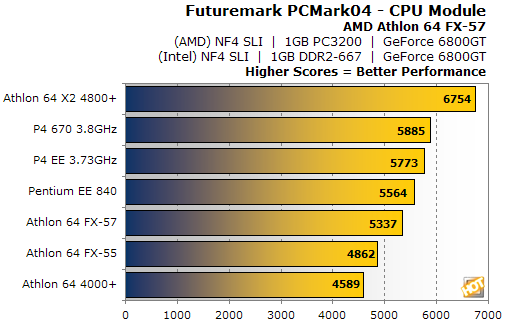AMD Athlon 64 FX-57: Sunny San Diego
We'll continue on briefly with more synthetic benchmark testing, which on its own isn't a true measure of real-world performance. However, it does complement a well-rounded benchmark perspective of overall performance within a given system architecture. PCMark04 is next.
|
"The CPU test suite is a collection of tests that are run to isolate the performance of the CPU. There are nine tests in all. Two pairs of tests are run multithreaded - each test in the pair is run in its own thread. The remaining five tests are run single threaded. These tests include such functions as file encryption, decryption, compression and decompression, grammar check, audio conversion, WMV and DivX video compression."

PCMark04's CPU performance module is a multi-threaded benchmark, which is why the HyperThreading enabled Pentium 4s, the dual-core Pentium Extreme Edition 840, and Athlon 64 X2 4800+ put up such impressive scores. The Athlon 64 FX-57 performed very well, besting the FX-55 and 4000+ by impressive margins, but it's not clocked quite high enough to overtake any of the CPUs that are capable of processing simultaneous multiple threads.
|
|
The following are details of the types of tests run by PCMark04's Memory Test Module.
"The Memory test suite is a collection of tests that isolate the performance of the memory subsystem. The memory subsystem consists of various devices on the PC. This includes the main memory, the CPU internal cache (known as the L1 cache) and the external cache (known as the L2 cache). As it is difficult to find applications that only stress the memory, we explicitly developed a set of tests geared for this purpose. The tests are written in C++ and assembly. They include: Reading data blocks from memory, Writing data blocks to memory performing copy operations on data blocks, random access to data items and latency testing."

The memory performance module incorporated into PCMark04 wouldn't cooperate with either our X2 4800+ or Athlon 64 FX-57. The new memory controller integrated into Athlon 64 processors based on the Venice and San Diego cores seem to choke on the "Raw Block Write 8MB" portion of the test, hence the pair of WNRs in the graph above. We explained this problem to AMD, and they were unable to replicate it, but our test systems crashed consistently on this test. We're still investigating this further but AMD claims they were able to complete the test on their test bed using the identical motherboard and BIOS versions we tested with.






